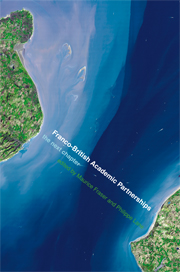Book contents
- Frontmatter
- Contents
- Notes on Contributors
- Foreword by His Excellency Bernard Emié
- Foreword by Sir Peter Westmacott
- Preface
- Part I Teaching and Training Partnerships
- 1 Why is the United Kingdom Important to Sciences Po?
- 2 Franco-Welsh Academic Partnerships: A Case Study Involving Transnational and Cross-sector Mobility
- 3 Double Diplomas: A Franco-British Training Route of Excellence for Teachers of French Worldwide?
- 4 The Entente Cordiale: A Grande École Engineering School Perspective
- 5 Links Between British Universities and French Instituts Universitaires de Technologie: New Forms of Collaboration
- 6 One Model: The Franco-German University
- 7 Raising Students' International Profile: How Do Universities Address This Issue in Europe?
- 8 Franco-British Academic Partnerships at the University of Provence
- 9 University College London and France: Teaching and Research Collaborations
- 10 Université Paris 1 Panthéon-Sorbonne: An Overview of More Than 30 Years of Franco-British Partnerships
- 11 Towards a Vision for a Networked European Business School
- Part II Research Partnerships
- Part III Broader Perspectives
- Appendices: Addresses and Speeches at the Franco-British Academic Partnerships Seminar, French Institute, London, 5 February 2010
- Index
11 - Towards a Vision for a Networked European Business School
from Part I - Teaching and Training Partnerships
- Frontmatter
- Contents
- Notes on Contributors
- Foreword by His Excellency Bernard Emié
- Foreword by Sir Peter Westmacott
- Preface
- Part I Teaching and Training Partnerships
- 1 Why is the United Kingdom Important to Sciences Po?
- 2 Franco-Welsh Academic Partnerships: A Case Study Involving Transnational and Cross-sector Mobility
- 3 Double Diplomas: A Franco-British Training Route of Excellence for Teachers of French Worldwide?
- 4 The Entente Cordiale: A Grande École Engineering School Perspective
- 5 Links Between British Universities and French Instituts Universitaires de Technologie: New Forms of Collaboration
- 6 One Model: The Franco-German University
- 7 Raising Students' International Profile: How Do Universities Address This Issue in Europe?
- 8 Franco-British Academic Partnerships at the University of Provence
- 9 University College London and France: Teaching and Research Collaborations
- 10 Université Paris 1 Panthéon-Sorbonne: An Overview of More Than 30 Years of Franco-British Partnerships
- 11 Towards a Vision for a Networked European Business School
- Part II Research Partnerships
- Part III Broader Perspectives
- Appendices: Addresses and Speeches at the Franco-British Academic Partnerships Seminar, French Institute, London, 5 February 2010
- Index
Summary
Introduction
Globally, the majority of business schools claim to be internationally networked. In reality, however, this is confined to a range of single point international alliances rather than a truly embedded network of schools. Oxford Brookes University Business School and Burgundy School of Business believe that one model for the future is that of a strategic alliance based upon a networked school. This has been characterised as:
An interdependent coalition of task and skill-specialized … organizational units that operates without hierarchical control but is embedded by dense lateral connections, mutuality, and reciprocity, in a shared value system that defines ‘membership’, roles and responsibilities.
This networked model is driven by the need for business schools to respond to the forces of globalisation and will be facilitated by the capabilities of information and communication technologies.
Achrol and Kotler characterise the Oxford Brookes University Business School and Burgundy School of Business model as an opportunity network. This type of network is organised around multi-point alliances focusing upon customer needs and market opportunities. Underlying this alliance is the notion of an internationally focused Anglo-French business school with the potential to add new partners to the network to create a truly European business school that reflects the European ideal.
There is a huge opportunity here. Europe represents the largest market in the world but is seen as lacking competitiveness compared with other economic blocs such as South East Asia and North America.
- Type
- Chapter
- Information
- Franco-British Academic PartnershipsThe Next Chapter, pp. 92 - 96Publisher: Liverpool University PressPrint publication year: 2011



